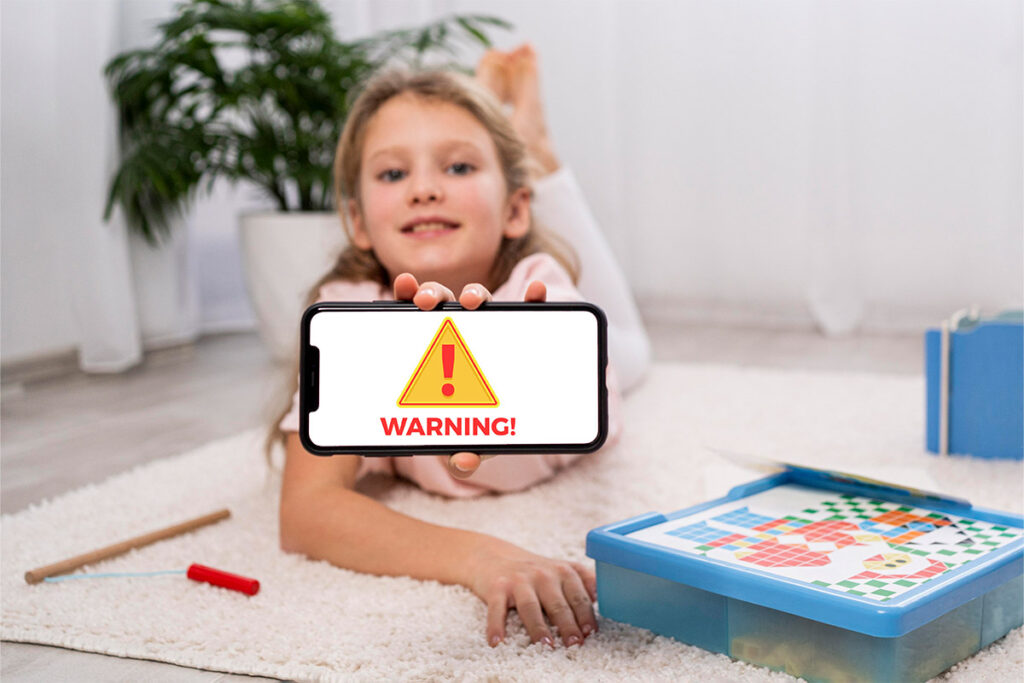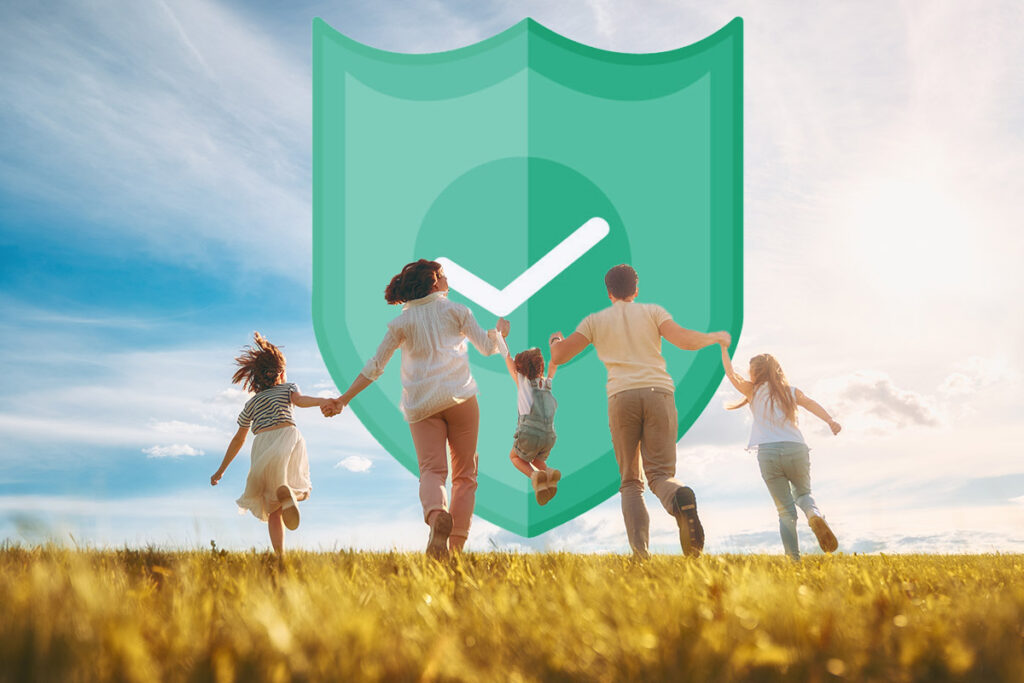
The 8 Dangerous Apps for Kids
With 1.96 million apps available on the App Store, knowing which are safe and which are potentially dangerous and toxic can be an ongoing challenge for parents. Even if you are aware of what is currently popular, new apps are going viral every month.
To help you navigate the minefield, this guide looks at the most dangerous apps for kids, tweens and teens.
Common questions asked by parents

Some apps are harmless and pose no threat to your child’s wellbeing if used in an appropriate way, while others are a breeding ground for inappropriate content, online predators and cyberbullying.
How can you keep track of which apps are suitable for your child, and which are not? Parents have so many questions about the dangers of mobile apps. Here are some of the most common ones which may resonate with you:
- What are unsafe apps for kids?
- What apps do child predators use the most?
- What are the most dangerous social media apps?
- What are dangerous YouTube apps for kids?
- What is the most toxic app?
- What apps can be dangerous?
- Which app is harmful in my phone?
- Are there dangerous apps?
- What apps should you avoid?
What are the 8 dangerous apps for kids?

Keeping up with all the latest apps your child wants to download can be daunting. That’s why we’ve compiled a list of the different types of apps that could pose a danger – from popular social media apps to lesser known secret storage apps. So, what are the 8 dangerous apps that parents should be aware of?
Chat apps
Chat apps – also known as social talking apps and messaging apps– have transformed the way we communicate. WhatsApp is the most popular chat app worldwide and is a great way to keep in touch with friends and family. Messages, photos and videos shared through WhatsApp are relatively safe thanks to end-to-end encryption. However, strangers might still find a way to chat with your child on WhatsApp, so it would be wise to monitor your child’s activity.
Other chat apps pose more of a risk. These include Discord – where kids hang out and talk about gaming – which can expose them to a range of inappropriate content from radical views to pornography. Another dangerous messaging app is Kik due to its sexual content and opportunities to meet strangers in chat rooms.
Social media apps
Here are some features of the most popular social media apps among tweens and teens that parents are likely to find concerning:
- YouTube – it’s not just the videos that can be unsuitable for children, the comments underneath can contain inappropriate content too.
- Snapchat – although content disappears after 24 hours (which might encourage some kids to share inappropriate pictures), people can take a screenshot before an image vanishes.
- TikTok – accounts are set to public by default so strangers could make contact with your child.
- Instagram – the direct messaging feature can be risky because even if your child’s profile is private, strangers can still contact them.
- Twitter – an easy place to access porn and kids don’t even need the app to view it.
- OnlyFans – This app is not meant for kids, but many unfortunately use it. Sex workers, celebrities and influencers share videos, photos and live streams with subscribers.
Video editing apps
It’s not just social media apps that can be dangerous for tweens and teens but the tools they use to produce content for TikTok, Instagram etc. On the surface, the video creator and editor app Zoomerang is a harmless way to make videos, apply filters and add special effects. However, it has a dangerous location-tracking feature which means that online predators can pinpoint where your child is when they are using the app.
Secret storage apps
The very nature of this type of app means that many parents don’t know it exists – and that itself should be a red flag.
A secret storage app allows kids to hide photos, videos and other files in a password-protected place. They might use it to conceal inappropriate content sent to or by an online predator.
So, how can you check if your child has a secret storage app? You can start by checking your child’s phone for any suspicious apps. The app icon is likely to look harmless and inconspicuous, like a fake calculator. You can also search in the App Store or Play Store for popular secret storage apps such as Vault, Best Secret Folder, Hide It Pro, Secret Photo Vault, AppLock and Calculator Photo Vault. If there is a ‘Get’ or ‘Install’ sign next to them there is no cause for concern. However, if any have ‘Open’ next to them, it means the app is installed on your child’s phone.
Anonymous apps
Anonymous apps are as risky as they sound and have a huge potential for cyberbullying, sexual content and spreading malicious rumors. Apps like Tellonym and Yik Yak are popular with teenagers who can anonymously ask questions and share information with strangers without having to set up an account. Omegle, an anonymous video chatting app, is potentially more dangerous as kids can be exposed to graphic sexual content. Predators can use the app to groom children and share photos and videos afterwards.
Live streaming apps
Live streaming apps are highly risky for impressionable tween and teens. The videos are live, unmonitored and uncensored, so there is nothing to protect kids from inappropriate content. Certain live streaming apps have features which are particularly concerning:
- Live.Me shares the broadcaster’s location and allows users to pay others for photos.
- Twitch allows private messages called ‘whispers’. These can be sent to anyone if you know their username.
- Bigo Live has no age verification and users must provide personal info such as their age and location.
- Houseparty allows users to send links via chat and take screenshots.
Dating apps
So, how dangerous are dating apps for kids? Many teens use dating apps- such as Yubo, Spotafriend, Mylol and Hot or Not – out of curiosity with no intention of meeting up with anyone in person. However, they pose worrying online dangers for teenagers.
Dating apps can be a magnet for sexual predators who can pretend to be someone much younger by entering a false birthday when registering on the site. Plus, dating profiles can include intimate photos and explicit videos. If you discover your child has a dating app on their phone, encourage them to delete it and use the opportunity to talk to them about online safety.
Video game apps
Although there are many benefits of playing video games, some mobile apps can be risky for young players.
Many popular multiplayer games, including Among Us and Fortnite, have an in-game chat feature which can attract online predators. Some video game apps feature adult content like weed-dealing in Drug Grand Mafia, and violence and murder in Grand Theft Auto IV.
So, what can you do to keep your gamer safe online? There isn’t a dangerous apps list we can share because there are new mobile games being launched every month. But you can regularly ask your child what they are playing to check its age appropriate and get involved in their gameplay. You can also follow this list of healthy gaming habits by age.
How to protect your child from dangerous apps

So, how can you keep your child safe online without denying them access to all the latest apps? We recommend using this guide to complement your own research into online safety, having an open conversation about the potential risks and regularly monitoring which apps they are using.
Sometimes, young gamers become addicted to certain apps – like Discord or Twitch – which can be linked to video game addiction. If your child is gaming problematically, we can help.
At Game Quitters, our Respawn program is designed to get their gaming under control and our Reclaim program is for families affected by gaming.
To find out more, get in touch to book your free Gameplan call.
